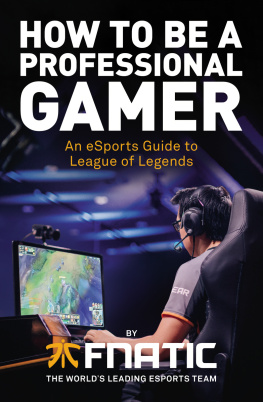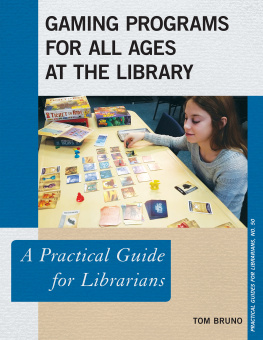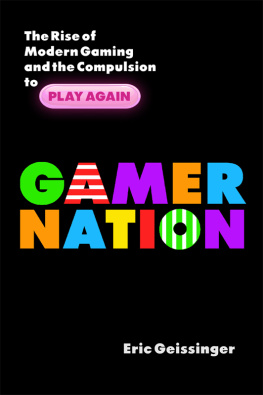The Civilized Guide to Tabletop Gaming
Rules Every Gamer Must Live By
Teri Litorco

Avon, Massachusetts
Copyright 2016 by Teri Litorco.
All rights reserved.
This book, or parts thereof, may not be reproduced in any form without permission from the publisher; exceptions are made for brief excerpts used in published reviews.
Published by
Adams Media, an imprint of Simon & Schuster, Inc.
57 Littlefield Street, Avon, MA 02322. U.S.A.
www.adamsmedia.com
ISBN 10: 1-4405-9796-0
ISBN 13: 978-1-4405-9796-1
eISBN 10: 1-4405-9797-9
eISBN 13: 978-1-4405-9797-8
Cover design by Heather McKiel.
Cover and interior images iStockphoto.com/Aaltazar; iStockphoto.com/Alex Belomlinsky.
Introduction
Gaming is a special gift you give yourself: Its the opportunity to create memories while doing something fun with the people who matter in your life. Unfortunately, like a disaster dinner party, it can sometimes be a way to create a special hell for yourself and others. While learning the complicated rules of some games may seem hard, harder still are mastering the unspoken rules: rules of social interaction at the gaming table, learned through painful lessons or friend-of-a-friend anecdotes told in hushed tones.
Newbie gamers may not know that cheese-dust-covered greasy snacks are a no-no food at gaming nights. That is, until they get an icy stare from their host after leaving an orange thumbprint on the special blank Cards Against Humanity card Wil Wheaton filled out and signed for him at the last comic convention.
(If youre wondering why hes mad, its because he waited two hours in line to get that autograph, and it also cost him $40 plus the cost of parking and entry. Way to be a dick, n00b!)
While the tartrazine-coated finger situation may seem minor, there are other social gaffes that have bigger ramifications. Take, for example, the cautionary tale of Devon and Kim (not their real names).
Devon and Kim are tried-and-true gamers. Theyve played video games and tabletop games for many years and met and became a couple through gaming. One terrible night they and a group of friends decided to play Werewolf.
I swear to you, I am not the werewolf. Kim said, looking Devon straight in the eye. Devon was the hunter, tasked with saving the village from the Werewolf. Kim and another friend were the last two villagers left.
I dont believe you, replied Devon. He figuratively shot Kim with his silver bullet. Unfortunately for them and their friends, Kim was telling the truth.
It made for a very painful car ride home after the gaming session.
And if you think reading about this seems awkward, imagine being one of the other fifteen people sitting in the same room with them. Such drama does not a good gaming night make.
Games arent just comprised of cardboard and bits of plastic, wood, or metaltheyre about people. Theyre conduits for sharing unique experiences. Those experiences can be good, or they can be bad. The goal of this book is to show you how to make the most of each gaming experience so its the best it can be.
After all, a tabletop game is really no good if you dont have others to play with you, even if those games come with solo-play rules.
The rules in this book will help prevent awkward and uncomfortable situations. Use these tips to try and mitigate the various minor annoyances that come from dealing with other people.
This book is a reference you can go back to again and again; you can also use it as a not-so-subtle hint to a friend to help him adjust his behavior for your next gaming night.
Ive brought to bear my experience gleaned from years of being involved in tabletop gaming, having watched gaming groups fight, splinter off, or collapse; seeing great gaming hosts and poor ones; attending conventions, gaming events, and tournaments; and playing loads of late gaming nights.
This horde of tips will give you the knowledge and tools to help manage the dynamic relationships of a gaming group and gaming buddies. There are also tips and tricks for creating fun and enjoyable gaming nights, and making sure youre invited back by all those you play with. Ill help you navigate conventions, and even give you some tips to maintain and upgrade your games collection.
I wrote this book to help all gamers make the most of their gaming experiences and avoid the social unpleasantness that can also occur when you break those unspoken rules mentioned earlier. So lets get started grinding up those gaming skillssoon enough youll have a killer proficiency bonus to all things tabletop.
Chapter One
Your Friendly Local Gaming Store: The Starting Position
Your friendly local gaming store (FLGS) is much more than a place to buy games. Its the center of your gaming community. For that reason, its important that you know the etiquette of behaving in it. After all:
- Its a purpose-built space where you can play games with old friends.
- Its a gathering place to meet and make new gaming friends.
- Its a venue for organized and competitive gaming events.
- Its a place that collects and curates products that can protect your games and accessories to improve your gaming experience.
- Its a place that gives you the chance to handle and try games you would otherwise never have the opportunity to play.
- Its an information resource for gaming that can recommend games specific to your tastes and likes.
Being well behaved in your FLGS isnt just a matter of politeness. Its part of the cement that holds the structure together and helps it perform all these important functions. Naturally, in supporting your FLGS you want to do it the right way. You want to be welcome each time you walk through the door and never see the staff ducking behind the counter to avoid you. In this chapter youll learn how to become a valued member of your FLGSs community.
When I first walked into my FLGS, I saw on the shelves and walls the games that I loved and played. I saw people playing those games on the tables. I was greeted and welcomed by the staff, and nobody treated me as if I was going to steal anything. I found my favorite brand of paints to paint minis with, I talked with the people there about games I love, and I found out they were regularly gaming on days I was free. I had found my gaming home.
Part of finding a community you fit into is also knowing yourself and having the tools and vocabulary to identify the kind of gamer you are, the kinds of games you like, and the mechanics that you find engaging. Not all games are for all gamers. Knowing yourself and those you play with within your gaming community is key to all having fun, which makes the culture of your FLGS matter. You want to find players who love games you love and enjoy playing games in a way that is enjoyable to you.
Your FLGS is the heart of your local gaming community, and supporting it means supporting gaming culture where you live. The more that culture flourishes, the better it is for you as a gamer. Your FLGS will stock more games and youll have access to more people who play. And youll probably help a local small-business owner feed her or his family, so that smugness about fueling the engine of your nations economy is free with each purchase.
Identify the Right FLGS for You
Finding a local gaming store seems easyenter some basic keywords like tabletop games store along with where youre living into a search engine and youll get some results. That said, finding an FLGS that is a fit for you takes a little more than that. And you have to figure out the etiquette of fitting into your FLGS. Remember: your FLGS is more than just a store; its like an informal social club, or a bar where everyone (well, maybe not






![Ethan Ham [Ethan Ham] - Tabletop Game Design for Video Game Designers](/uploads/posts/book/119417/thumbs/ethan-ham-ethan-ham-tabletop-game-design-for.jpg)

